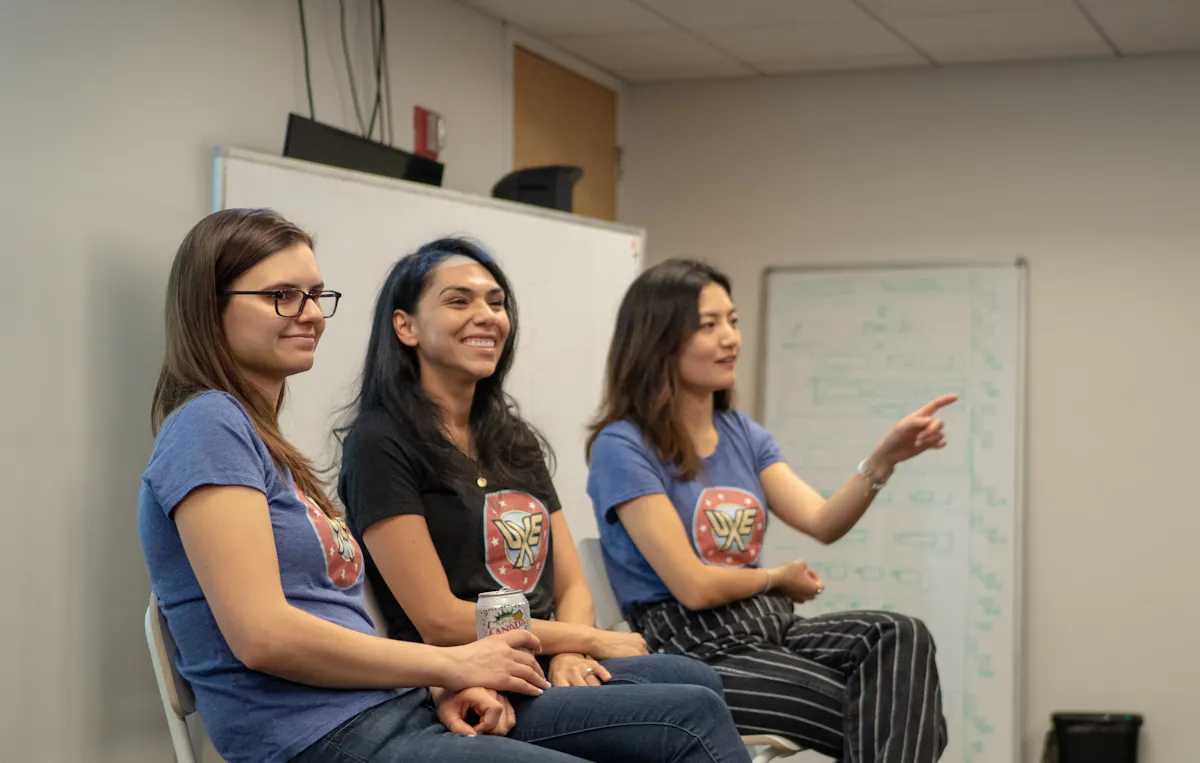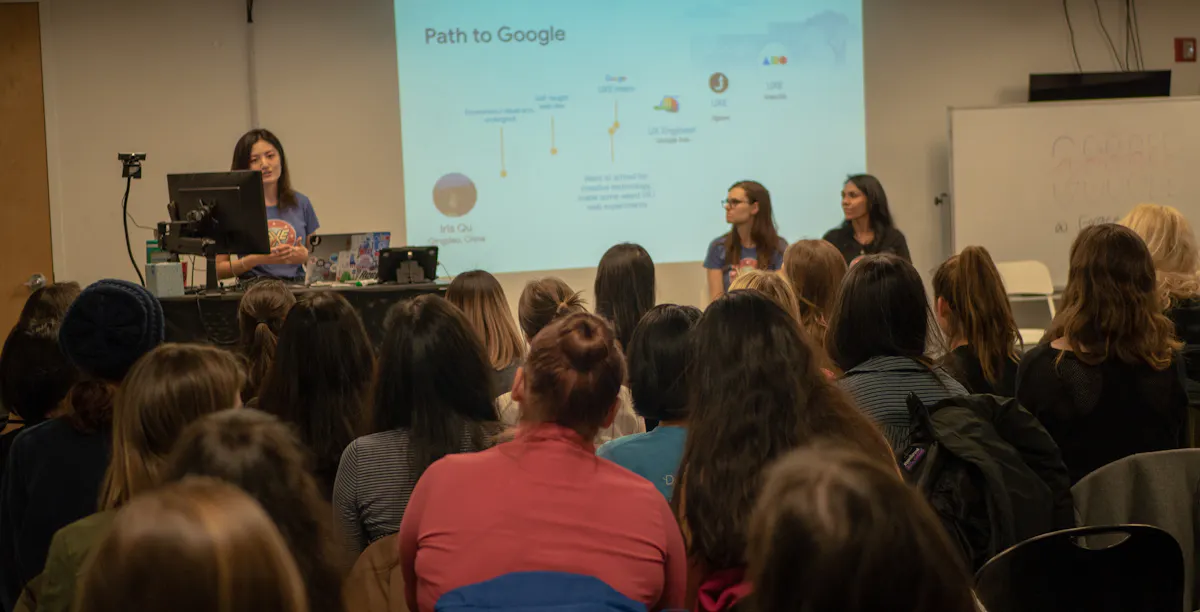Fill out the form to get more information about the Fullstack Academy bootcamp of your choice.
05.12.2025
What It Takes to Be a UX Engineer: Skills and Salary Outlook
By The Fullstack Academy Team

Last Updated: May 2024
If you’re considering attending a coding bootcamp, you may be wondering what your post-graduation career options may be. Front-end or back-end engineers, mobile app developers, and video game programmers are just a few of the exciting opportunities within the field.
Finding the right career path can be challenging, but the Career Success team at Fullstack Academy can help you navigate your first move, and even introduce you to careers you might not have thought of.
One concentration that may be of interest to Fullstack Academy and Grace Hopper Program coding bootcamp graduates is UX engineering. Grace Hopper Program graduate and senior UX engineer at Google, Johanna Perez, demystifies and discusses the field—offering insight into the skills needed for the role, what the day-to-day is like, and more.

Who is a UX Engineer?
A UX Engineer, or User Experience Engineer, essentially bridges the gap between design and development. They approach technical programming through the lens of design best practices to craft user-friendly, compelling digital products. UX Engineers focus on the user journey, ensuring websites and apps are intuitive, enjoyable, and meet user needs. They collaborate with designers, developers, and researchers to bring exceptional user experiences to life.
What Does a UX Engineer Do?
A UX engineer is a combination of a user-experience (UX) designer and a user interface (UI) developer. They’re a full stack developer who understands design principles. UX engineers, or UXEs, possess the skill set of a front-end or UI engineer, but they have a working knowledge of UX design principles.
“To be a successful UX engineer, you need to always be thinking as a user. A user experience engineer is a developer who specializes in solving user-interface design and implementation problems for user-facing features in products,” Johanna says.
Primarily focusing on the design/UI component layer of an application, UX engineers are needed in a variety of industries, from AR and VR to finance and commerce, and the day-to-day is never the same.
“You need to be a JavaScript expert, as that is the web's front-end language, but you also need to have design sensibilities, meaning you understand how to see things with an eye for detail, flow, and usability for the user,” Johanna says.
Make Your Move.
Take the first step in your journey by submitting an application to one of Fullstack Academy's immersive bootcamps.
What Skills Does a UX Engineer Need?
If you complete Fullstack Academy’s software immersive program or the Grace Hopper Program, you’ll already have many of the skills you need to be successful as a UX engineer.
Common requirements for a UX engineering job include:
Collaborating with designers and stakeholders
Developing realistic digital prototypes that will be used to guide design decisions, user research sessions, and product demonstrations
Continuously iterating on prototypes based on feedback from research, product, and design
Proficiency in JavaScript, HTML, and CSS
Ability to develop independently with experience making decisions about which technology and frameworks to use for the goal of the prototype being built
Experience crafting prototypes across a variety of platforms
Johanna also recommends being familiar with Material Library and other commonly used libraries, like Python, and having a website or portfolio to showcase your work.

How to Become a UX Engineer
Wondering how to become a UX Engineer? Equipping yourself with the UX skills and experience is key to landing a UX Engineer role. Here's a roadmap to get you started:
Learn the UX Design Fundamentals: Build a solid foundation in user experience (UX) principles, information architecture, interaction design, and usability testing. Online courses, tutorials, and UX bootcamps can jumpstart your learning.
Gain Technical Expertise: Develop proficiency in front-end development languages like HTML, CSS, and JavaScript. Understanding how code translates design into reality is crucial for UX Engineers.
Build Your Portfolio: Showcase your UX skills through personal projects or volunteering for UX design projects. A compelling portfolio demonstrates your unique design thinking processes and problem-solving abilities.
Network & Continuously Learn: Connect with other UX professionals, attend industry events and meetups, and stay updated on the latest UX trends and technologies. The UX field is constantly evolving, so a commitment to lifelong learning helps you to stay agile.
The Software Engineering Immersive at Fullstack Academy and the Grace Hopper Programwill help you acquire the in-demand skills employers are looking for. Led by industry-experienced instructors, you’ll gain hands-on experience in software development that will open doors to a variety of careers within the field. Plus, you’ll work on real-world projects and create a portfolio of projects to demonstrate your abilities to potential employers.
What Salary Can You Expect to Make as a UX Engineer?
Now that you’ve learned the path on how to become a UX engineer, it is important to understand the salary trends for UX design roles. According to April 2024 data from Glassdoor, the average salary for a UX engineer in New York City is $155,935, while those interested in more senior-level UX engineering roles can expect salaries as high as $238,682.
These numbers show that UX engineering can not only be a fulfilling career, but it can also help you achieve your financial goals.
Make Your Move.
Take the first step in your journey by submitting an application to one of Fullstack Academy's immersive bootcamps.
Benefits of Being a UX Engineer
The UX Engineer role offers a compelling blend of creativity and technical challenge. Here are some key advantages to consider:
High Demand & Growth: UX skills are highly sought-after, with a projected market size of USD 32.95 Billion by 2030 globally for UX services, according to Fortune Business Insights.
Lucrative Salaries: UX Engineers typically earn competitive salaries, with a national median salary of $156,865, according to Glassdoor.
Creative Impact: You'll directly influence how users interact with digital products, shaping intuitive and enjoyable experiences.
Collaborative Environment: UX Engineering offers a varied workday, involving collaboration with a range of teams including designers, developers, and product managers.
Challenges of Being a UX Engineer
While becoming a UX engineer is rewarding, this role comes with its challenges:
Balancing Priorities: Bridging design and development can mean navigating conflicting priorities. You might need to advocate for user needs while considering technical feasibility.
Wearing Multiple Hats: UX Engineers often juggle various tasks—from prototyping to user research. This can require strong time management and multitasking skills to stay on schedule.
Stakeholder Management: Gaining buy-in from stakeholders with differing viewpoints can be a particular challenge. Effective communication skills then become crucial.
Keeping Up with Trends: The digital landscape constantly evolves. Staying informed about the latest UX trends and technologies is essential.
If you’re interested in helping design products that people love, UX engineering might be the perfect career for you.
Learn more about the many types of jobs available for people with software engineering training.


